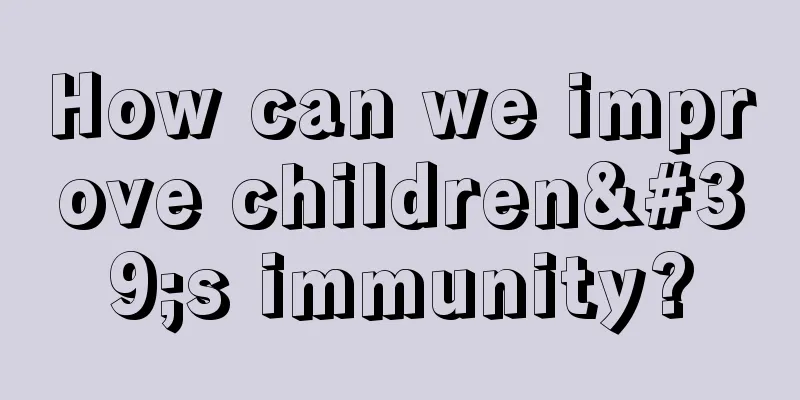Is it normal for a four-year-old baby to sweat while sleeping?

|
Sometimes babies sweat while sleeping, which makes mothers worry. Every child has a delicate and weak constitution, with thin muscles and skin, and is particularly prone to sweating compared to adults. It is normal for children to sweat only a small amount. On the contrary, if the child does not sweat at all, you should consider that there is a problem with sweat excretion. If the amount of sweating is excessive and accompanied by other symptoms, you should consider whether the child is sick. Children's sweating may manifest as sweating on the hands and feet, sweating in the chest and heart, sweating on half of the body, spontaneous sweating, night sweats, etc. In fact, sweating is a normal physiological phenomenon of the human body. Sweat can take away excess heat and some metabolic products such as uric acid and fatty acids in the body. Because children grow and develop rapidly, their metabolism is more vigorous than that of adults, and they generate relatively more heat and metabolic products. At the same time, children's autonomic nervous system is not fully developed. When they fall asleep, the sympathetic nerves in charge of the sweat glands will be temporarily excited due to the loss of control by the brain, resulting in excessive sweating. This is completely normal. As long as the child has no other symptoms, such as irritability, crying, easy waking, etc., there is no need to worry about him. This type of sweating often occurs within half an hour after falling asleep, and is mainly on the forehead. It usually stops slowly within 2 hours after falling asleep. It is more common in children aged 3 to 7 years old and gradually disappears with age. Some people call it physiological hyperhidrosis. However, if the child is usually weak and sweats profusely when falling asleep at night, as if he is being drenched in water, or even sweats all night long, wetting the pillow and clothes, and is accompanied by symptoms such as irritability, crying, and weight loss, then it is pathological hyperhidrosis. A common cause is vitamin D deficiency rickets. In addition to excessive sweating at night, there are also symptoms such as irritability, restless sleep, easy awakening, square head, baldness, and pigeon chest. If you have the above symptoms, you can supplement vitamin D and calcium in appropriate amounts under the guidance of a doctor. When eating, you should also pay attention to eating more foods rich in calcium, such as fish, shrimp skin, etc. With aggressive treatment, excessive sweating can be corrected quickly. In addition, the following points need to be done to help the baby's sleep sweating caused by the problem: 1. Get more exposure to sunlight, including outdoor light and reflected light. You can do activities outdoors, but don't expose yourself to the sun through glass. 2. Strongly advocate breastfeeding. 3. Premature babies, twins, children with frequent diarrhea or other digestive tract diseases should pay attention to adding vitamin D. 4. People in rural areas or cold regions in the north should take measures to prevent rickets, such as "sunbathing in the summer and taking D-drugs in the winter". Nursing work is very important. After a child has night sweats, you should promptly dry the skin with a dry towel and change clothes in time, and move briskly to prevent the child from catching a cold. Pay attention to replenish water and salt in time. Add some salt and sugar to boiled water. Sugar can promote the absorption of water and salt. Bedding should also be dried frequently. The function of sunlight is not only to heat and dry, but also to disinfect and sterilize. In addition, children who are prone to night sweats should undergo planned physical exercise, such as sunbathing, cold water baths, etc., to strengthen their physical fitness and improve their adaptability. Your physical condition will be improved and night sweats will stop, which will be better than any panacea. Parents should not panic if their baby has this condition. Refer to the above methods to help their baby grow healthier and happier every day. |
<<: What to do if your child has a viral cold
>>: What to do if your seven-month-old baby coughs
Recommend
Massage techniques for children with diarrhea
Children's health is what parents worry about...
Can children eat mulberries?
Mulberry is a dark-colored food. Although it is s...
What should I do if my baby suddenly has a runny nose?
Many mothers with babies are most afraid that the...
What to do if your child has a lot of eye mucus when sleeping
As children grow up, parents will certainly caref...
What to do if your baby has difficulty defecating
Many babies have difficulty defecating due to var...
Age when deciduous teeth come out
Babies usually have no teeth after they are born,...
4.5 month old baby milk
How much milk should a 4.5-month-old baby eat to ...
What causes a child's heart to ache?
The physical health of children is a very importa...
What food is better for children with diarrhea?
The health of the baby often concerns the parents...
What to do if your child has precocious puberty?
Many young children have problems with precocious...
Can children drink red bean and barley soup?
Many people like to eat this red bean and barley ...
Baby scratches his head when sleeping at night
Newly upgraded prospective parents still know ver...
Whose genes does a boy inherit more?
The formation of the embryo is mainly due to the ...
What to do if your child doesn't sleep at night?
Many children always have the experience of not b...
The baby's ribs protrude when lying down
The baby's physical health is the most import...









